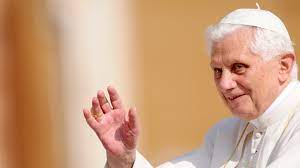~ by Andrea Tornielli, Vatican News
 Not since 1417 has the death of a (former) Pope not brought with it the end of a pontificate. Saturday’s death of Benedict XVI, born Joseph Ratzinger, comes nearly 10 years after he announced his unexpected resignation on February 11, 2013.
Not since 1417 has the death of a (former) Pope not brought with it the end of a pontificate. Saturday’s death of Benedict XVI, born Joseph Ratzinger, comes nearly 10 years after he announced his unexpected resignation on February 11, 2013.
Never before in the Church’s two-thousand-year history had a Pope resigned because he felt physically inadequate to bear the weight of the papal office. In a response given to journalist Peter Seewald three years earlier, Benedict had in some way anticipated it: “If a Pope clearly realizes that he is no longer physically, psychologically, and spiritually capable of handling the duties of his office, then he has a right and, under some circumstances, also an obligation to resign.”
Even though the conclusion of his reign came before the end of his life, creating a historic precedent of enormous magnitude, it would truly be unbecoming to remember Benedict XVI for this alone.
After the death of John Paul II, the conclave held in 2005 elected Ratzinger – already an old man of 78 years – to succeed him in less than 24 hours. Ratzinger was universally esteemed and respected, even by his adversaries.
From the loggia of Saint Peter’s Basilica, Benedict XVI presented himself as “a humble worker in the vineyard of the Lord”. He wanted to “listen, together with the whole Church, to the word and the will of the Lord.
Pope Benedict continually spoke of the “joy of being Christian”. He dedicated his first encyclical, Deus Caritas Est, to the love of God. “Being Christian”, he wrote, “is not the result of an ethical choice or a lofty idea, but the encounter with an event, a person.”
To read the entire account, please click here
